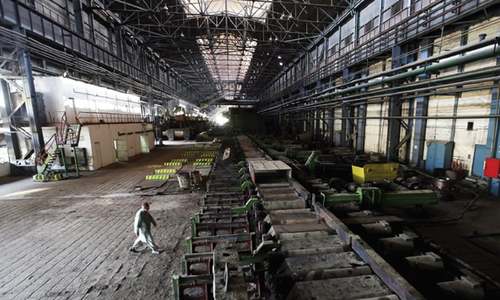The Supreme Court, while hearing a petition concerning a shortage of funds to pay provident funds and gratuities to former Pakistan Steel Mills (PSM) employees, on Monday barred the government from selling land owned by PSM to generate funds to do so.
A two-member bench, headed by Justice Gulzar Ahmed, has been hearing the case. The case had been presented to the apex court by the Ministry of Production. The deputy advocate general, who was representing the government, told the court that PSM did not have sufficient funds to pay salaries and provident funds to employees.
"We are selling the land in order to pay [outstanding] dues," he said.
Justice Ahmed criticised PSM's performance in response, saying: "Pakistan Steel Mills' output is zero. It has been ruined [by the responsible people] to fill their own pockets."
"Pakistan Steel Mills was [once] a huge institution. Hundreds of steel mills operated with the help of [PSM]," he recalled. "Cars, trucks and even rockets were prepared in PSM."
The bench, however, restrained the government from disposing of PSM land to address its financial crisis, saying it cannot be sold as "it belongs to the people".
The hearing was subsequently adjourned for 15 days.
Separately, an appeal against the attachment of an account operated by the Ministry of Industries and Production was also dismissed after the government withdrew it.
More than 5,000 employees have retired during 2013-19 and dues of more than Rs17bn are also payable, which resulted in the Sindh High Court freezing accounts of the ministry of industries on August 20, 2019, till the payment of dues.
In September this year, the PSM Stakeholders' Group, in a letter to the Privatisation Commission, said its members were the unheard victims of the ministry of industries and production as more than Rs80 billion dues of its members and Rs190bn of other creditors were struck up at the PSM, under the ministry as of July 2019, making the total liabilities at Rs270bn against Rs217bn reported by the ministry to the prime minister.
The group further said that stell mills’ four-year accounts from July 2015 to June 2019 were not audited for reasons best known to PSM and the ministry of industries. Therefore, there is also no authenticity of Rs217bn payable debts and liabilities quoted to the prime minister on August 5, 2019.
The PSM production had come to an end in June 2015 due to reduction in gas pressure by the gas company on account of bills’ non-payment and the government failed to restore the process in a period of more than four years. There are a number of cases pending in courts (local and abroad) filed by creditors and PSM. The PSM Coke oven Battery Plant (COBP) and two of its batteries are on heating mode since 2010 without any production of coke and are consuming gas costing approximately Rs50 million per month while its employees are never paid salaries on time.














































